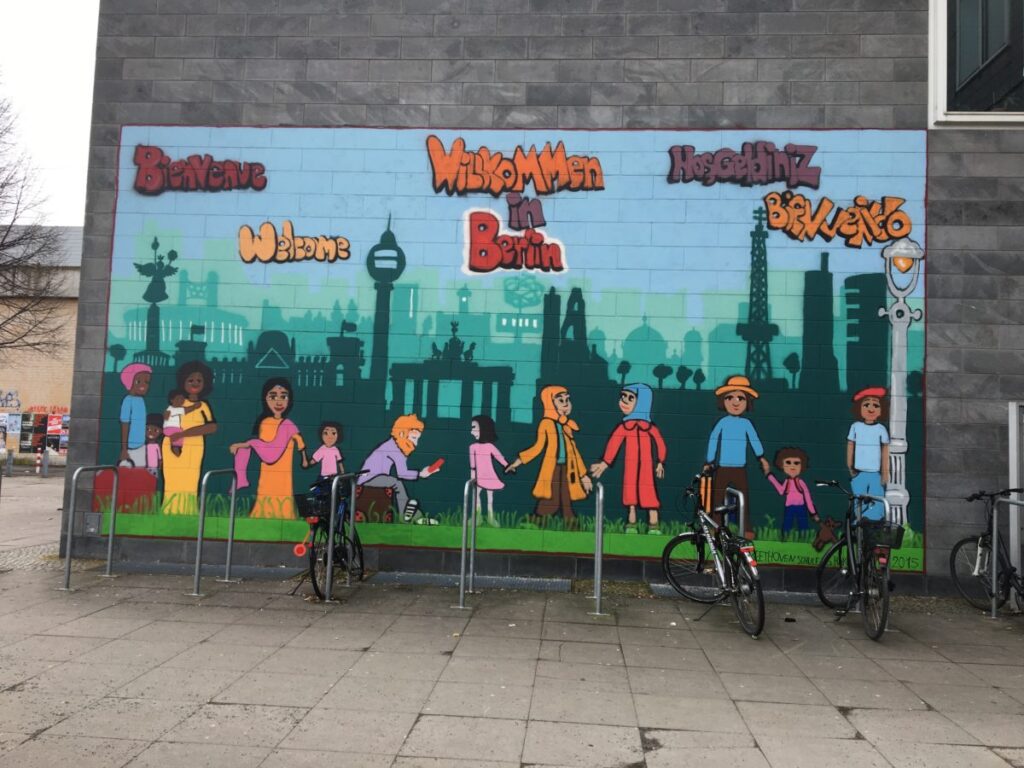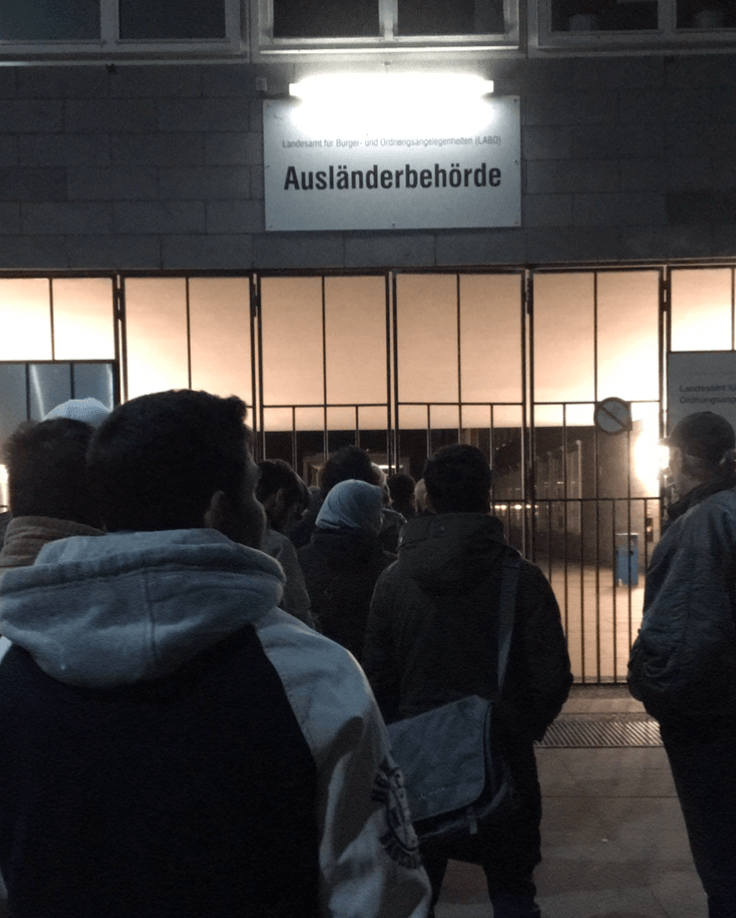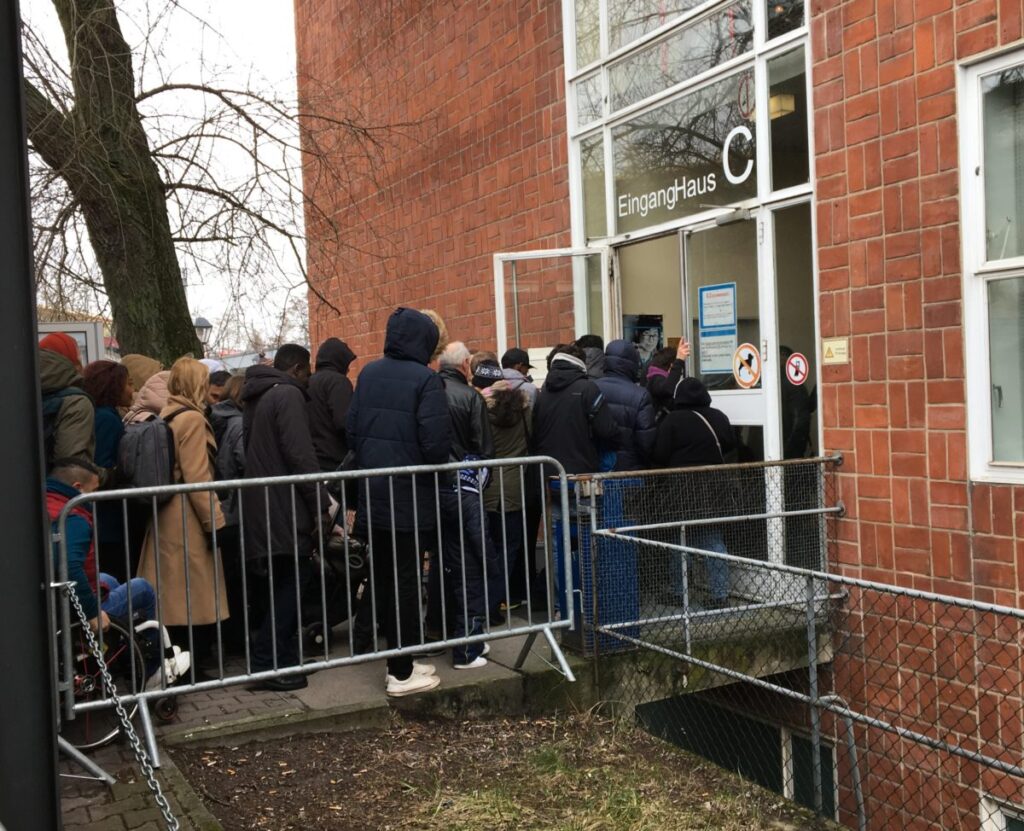How to Visit the Ausländerbehörde in Berlin Without an Appointment
Visiting the Ausländerbehörde (immigration office) in Berlin is sadly part of the deal if you’re an expatriate. Many people I know, myself included, have been there many times over and it’s never a fun experience. The hardest part is that it’s next to impossible to make an appointment any sooner than about four months away, which means the vast majority of people go to the Ausländerbehörde in Berlin without an appointment.
There are only a certain number of walk-ins allowed per day (the amount changes from day to day) which means employees will not hesitate to kick you out when they run out, even if you’ve already been waiting for three hours. Going to the Ausländerbehörde in Berlin without an appointment is tough, but often the only option.

Fair warning, the people who work the Berlin visa office are often grumpy, cold, and condescending. Many employees flat-out refuse to speak English to you, even if you tell them in German that you don’t understand. The people waiting to be helped are also a tough bunch. Nerves and anxiety are running high and people are stressed.
Still, if you plan on living here and need any kind of visa to do so, a trip to the Ausländerbehörde in Berlin is in your future. Here’s my best advice on how to do it without an appointment and make it suck as little as possible.
Which Ausländerbehörde in Berlin do you need to visit?
There are two different locations of the immigration office in Berlin, one in the Tiergarten neighborhood (Moabit) and one in Charlottenburg. The Tiergarten location is the head office, and most people can get their needs met here. The Charlottenburg office handles specific cases such as student visas and Schengen visa extensions. Find out more about which office you need to visit. I’ve personally only visited the Tiergarten location.
At this location, there are four different “houses,” Haus A through D. If you are from the US (Vereinigte Staaten von Amerika,) you must enter Haus C, climb two flights of stairs, and turn left down the corridor. The waiting then continues as you form a long line down this hall.
If you are not from the US, see this chart to figure out what Haus you must go to.
The first time I ever went to the Ausländerbehörde, I waited in the wrong line for over an hour. The thought of it still makes me shudder. To make sure this doesn’t happen to you, research the physical building ahead of time!
The golden rule: arrive early
On my most recent trip to the Ausländerbehörde in Berlin, I showed up with T-minus 50 minutes until opening, and there was already a line with at least 30 people in it. I would recommend showing up no later than 1 hour before the listed opening time. If you can arrive even earlier, all the better. No matter what, you’re going to have to wait a long time, but if you show up earlier at the beginning, you reduce the risk of them running out of walk-in slots before they get to you.

Hours for both Tiergarten and Charlottenburg locations:
Monday 07:00 a.m. – 02:00 p.m.
Tuesday 07:00 a.m. – 02:00 p.m.
Wednesday By appointment only
Thursday 10:00 a.m. – 06:00 p.m.
Friday closed
Make sure you check the hours on the official websites, not Google maps. The hours may differ on holidays, so always best to double-check!
How to Prepare for Your Visit
Practice some essential vocab
You might assume that since this is the immigration office we’re talking about here, it will be filled with foreigners. You might also assume that these foreigners coming from foreign lands will be speaking foreign tongues. You’d be correct in both of these reasonable assumptions. But should you be so bold as to think that since English is the lowest common denominator language in most cases, it will be utilized as such? Well, you’d be wrong.
I once heard an Australian woman asking an employee (in German) if she spoke English. The response was a harsh “Nein! Deutsch!” accompanied by a pointed nose in the air. Even refugees and asylum seekers are expected to speak German which is quite a tall order considering the circumstances they are likely coming from.
Consider also that this isn’t small talk about the weather or German 101. These conversations require complex vocabulary and listening comprehension that most foreigners simply don’t possess. Even to have such conversations in English it’s still confusing! Sadly, this doesn’t make the people there any more merciful.
Before arriving at the Ausländerbehörde, think through the conversations you might have and prepare some lines. If you can bring a native speaker with you, definitely do. Not only will things be less confusing but, in my experience, the employees with likely be warmer toward you.
Prepare your documents
When it comes to preparing your documents, think like a German would – thorough, organized, efficient. Research the service you need ahead of time and make sure you follow the instructions exactly. You can find a list of services provided at the Tiergarten location here and the ones provided at the Charlottenburg location here.

Make a list of questions
Through the process of preparing your documents, it’s very unlikely that you won’t be at least a little confused. German bureaucracy is one doozy of a subject, and I highly doubt that anyone understands it completely, even the people working there.
If you have questions about the process you’re going through, make a physical list so you don’t forget them. For bonus points of course, make sure you can ask all these questions in German and more importantly, understand the potential answers.
Check the weather and Bundle up
Because the first part of the waiting happens outside, it’s important to check the weather before making your way over. Berlin’s weather is less than desirable most of the time, and after living here for 6 months already, I feel like I’ve had enough rainy days for a lifetime. Although there is shelter over some of the areas where the lines form, if rain or snow is even a slight possibility, pack an umbrella just in case.
Needless to say, visiting the Ausländerbehörde in the wintertime is the most miserable time because you’ll likely be outside in the freezing cold for at least an hour. Even if it’s summer, arriving at five-something in the morning may still be awful chilly. Double-check the weather and dress appropriately!
Emotionally prepare yourself
Even when you tried your best to get everything right, it’s a confusing business and it’s easy to make mistakes. There’s the possibility you’re in the wrong place, that you don’t qualify for something, or that you have a mistake in your paperwork. They can also simply tell you to come back another day because they don’t have someone that could help you at the moment.

While it’s a terrible idea to get all in a panic about all the what-if’s, just brace yourself for anything and everything, especially people being rude to you.
What should you bring to the Ausländerbehörde in Berlin?
All your paperwork
Organize everything neatly in a folder as best you can. If you’re applying for something that requires lots of paperwork such as a freelancer visa, organizing everything in a binder is a great idea. Also, when in doubt, bring that extra paper. Having more won’t hurt you, but not having everything certainly will.
Headphones and a good playlist
The Ausländerbehörde is a mass of negative energy and it loves to drag people down. Bring those headphones and a happy playlist of your favorite band or podcast and keep your spirit high. Make sure to download them since the cell service in the buildings is less than good.
A mobile charger
Charge up your phone the night before, but in case playing all those podcasts/ music/ videos drains your battery, a mobile charger is always a good idea.
A book, journal, sketchpad, or anything else to keep you busy
You’re going to desperately need distractions during the long period of waiting. Think as if you were going on a cross-country road trip with your family – what would you bring? Make sure you can easily get immersed in these things to help the time pass faster.
Snacks and drinks
Chances are that if you’re at the Ausländerbehörde without an appointment you’ll be waiting for two hours at the absolute minimum. It will most likely be longer. Pack a drink and some food and snacks to keep the hunger pangs away. Always pack more than you think you need in case you’re stuck there for an ungodly amount of time. If you forget to pack some sustenance, all is not lost. Before you enter the building, there are some people with a little cart selling coffee right where the lines begin outside.

Cash
When you do finally get your visa or permit, you’ll need to pay, usually with cash. The machines take German EC cards, but most foreign visitors don’t have one of these, so they’ll need to pay in cash.
After the Ausländerbehörde, celebrate
Even if the outcome was negative or wasn’t how you planned, you still deserve to celebrate getting through it. Go out dancing with friends, ride a bike through a park, plan a sushi date with your partner, or if it’s summer and the weather is good, head to Capital Beach to have a drink and watch the tour boats float down the river. In some way or another, applaud yourself for your grit and perseverance. You survived the Ausländerbehörde in Berlin and that in itself is an accomplishment.
At the end of the day, no matter how you slice it, the Ausländerbehörde is a very unfun place to be. Nothing ever seems to go as planned, people are mean, and everything takes forever and a day. There’s sadly no way to sugarcoat these things.
However, being prepared (mentally, physically, paperwork-ly) and knowing what to expect helps tremendously. And still, no matter how stressful and painful it is, it’s a small price to pay for the amazing privilege of getting to live in Berlin.
If you’re on your way to Berlin’s Ausländerbehörde without an appointment, best of luck to you my friend. You can do this!
May 20, 2018